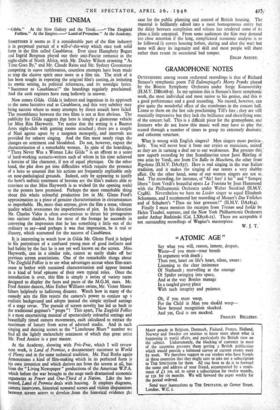GRAMOPHONE NOTES
OUTSTANDING among recent orchestral recordings is that of Richard Strauss's symphonic poem Till Eulenspiegel's Merry Pranks played by the Boston Symphony Orchestra under Serge Koussevitzky (H.M.V. DB6268-9). In my opinion this is Strauss's finest symphonic work, the most individual and most native to his genius, and this is a good performance and a good recording. No record, however, can give quite the wonderful effect of the trombones in the concert hall. Listen to them on the last side proclaiming Till's fate ; they are still musically impressive but they lack the brilliance and electrifying tone of the concert hall. This is a difficult piece for the gramophone, and listeners who do not know this music well may have to play the record through a number of times to grasp its extremely dramatic and coherent structure.
What is wrong with English singers? Men singers more particu- larly. You will never hear it from our critics or musicians, united as they are in turning a deaf ear to our weaknesses. But procure this new superb recording by that Scandinavian tenor Jussi Bjorling of two arias by Verdi, one from Un Ballo in Maschera, the other from Rigoletto (H.M.V. DA1837). Here is real singing in the true Italian' tradition, and it makes the singing of our tenors a very shabby affair. On the other hand, some of our women singers are not se bad. The recording, for instance, of "Ah! fors' 6 lui" and " Sempre libera" from Verdi's beautiful opera La Traviata by Joan Hammond with the Philharmonic Orchestra under Walter Susskind (H.M.V. C3486). Nevertheless we have no Lieder singer to equal Elizabeth Schumann, and I recommend her recording of Mozart's Das Veilchen and of Schubert's "Dass sie bier gewesen!" (H.M.V. DA1854).
Finally I must mention the excerpts from Tristan and Isolde by Helen Traubel, soprano, and the New York Philharmonic Orchestra under Arthur Rodzinski (Col. LX8518-21). These are acceptable if not outstanding recordings of Wagner's masterpiece.
W. J. T.


























 Previous page
Previous page